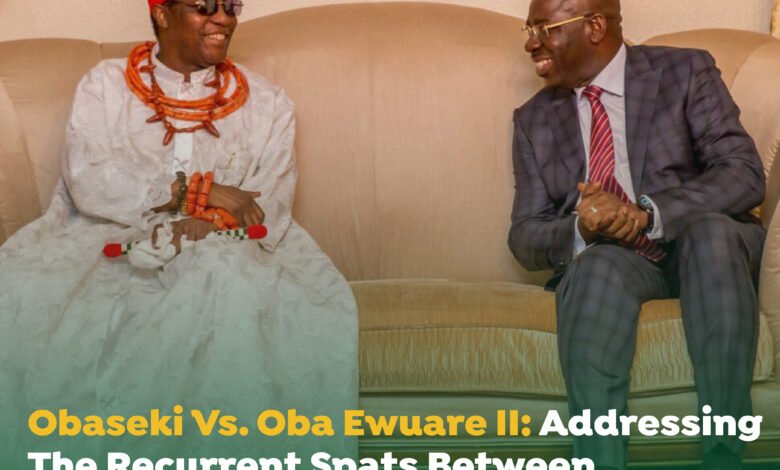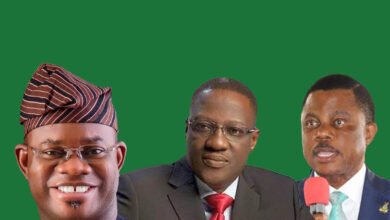Obaseki Vs. Oba Ewuare II: Addressing The Recurrent Spats Between Governors and Monarchs

The ongoing rift between the Governor of Edo, Godwin Obaseki, and the Oba of Benin, Oba Ewuare II, has reignited concerns about the avoidable clashes between state governors and traditional rulers in Nigeria.
While the root cause of the current tension remains officially unclear, there are inisnuations around a number of possible factors.
One is Governor Obaseki’s alleged support for the “balkanisation” of the Benin Kingdom, essentially dividing it into smaller units.
This is said to deeply offend the historical and cultural unity cherished by the Oba and many within the Kingdom. Another source of friction might be disagreements over the repatriation of stolen artifacts, a sensitive issue with significant cultural and financial implications.
Courtroom Drama:
Meanwhile, a court document has surfaced on the internet, sparking outrage. The court document, originating summons (FORM 3) with suit number 3/290, has Oba Ewuare and Edo state Attorney General as defendants in a case instituted by H.R.H Prof. Gregory Idurobo Akenzua (Enogie of Evbo-Obanose/Abudu and H.R.H. Edomwonyi Iduozee Obiegbaen (Enogie of Egbaen-Siluko) as claimants.
Legal analyst Dr. Aisha Hassan believes this lawsuit, if proven to have the Governor’s backing, could be a calculated move to undermine the Oba’s authority. “Such actions, if true, highlight the Governor’s potential overreach and disregard for the traditional system,” Dr. Hassan warns.
Governor’s Defense:
Reacting to the allegations, Governor Obaseki’s spokesperson maintains the state government’s neutrality in the court case. “The Edo State Government has no case in court against our revered Royal Father, Omo N’Oba N’Edo Uku Akpolokpolo, Oba Ewuare 11, the Oba of Benin”, a statement by the Special Adviser (media project) to the Governor clarified.
“The rumour making rounds on social media of an impending court case is the handiwork of enemies of the state and should be disregarded”, the statement noted.
However, political commentator Mr. Femi Akintola suggests the public deserves a more comprehensive response.
“The Governor should directly address the concerns about his stance on the Kingdom’s unity and the leaked court document,” Mr. Akintola advises.
Clash of Titans
The current situation reflects a broader power struggle in Nigeria. As Professor Olutayo Adeshina, a history professor at the University of Lagos, explains, “The Nigerian constitution grants governors immense power, potentially overshadowing the historical and cultural significance of traditional rulers.”
This imbalance has played out before as the 14th Emir of Kano, Muhammad Sanusi was unceremonioulsy dethroned by former Kano State Governor Umar Ganduje in 2020 for “insubordination to the Governor”. Sanusi’s removal marked one of the significant setbacks for the traditional institution in the country.
A similar scenario played out in Rivers State where former Governor Nyesom Wike ousted His Royal Majesty Monday Noryaa, the traditional ruler of Baabe Kingdom for alleged cultisim.
Looking Beyond the Spats:
These clashes have far-reaching consequences. Dr. Nneka Okafor, a sociologist, emphasizes the potential erosion of social order and cultural identity. “Traditional rulers have long been the custodians of customs and traditions. Weakening their authority can create a sense of cultural dislocation and disrespect for the past,” Dr. Okafor warns.
Some have proposed the Malaysian system as a potential solution to these spats. Unlike Nigeria’s winner-takes-all approach, Malaysia has a unique rotational monarchy. Every five years, a different Sultan from a specific region is chosen to serve alongside the Prime Minister. Currently, Sultan Ibrahim Sultan Iskadar is the country’s 17th king under the unique rotational monarchy.
Dr. Akintunde Babatunde, a political scientist, explains, “This system ensures a balance between traditional authority and elected leadership. It also fosters national unity by representing the diverse regions of the country.”
A Call for Reform:
While the Malaysian model might not be a direct solution for Nigeria’s complex situation, many believe it offers valuable insights.
Experts agree that a more balanced relationship between governors and monarchs, potentially through constitutional reforms or clearly defined roles, could be a step towards resolving these recurrent conflicts and preserving the vital role of traditional institutions in Nigerian society.





